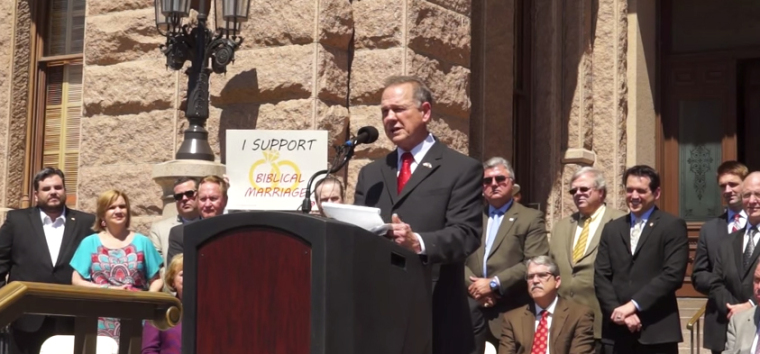Absent new laws, clergy & business owners could face lawsuits, penalties

DALLAS (Christian Examiner) -- Claiming "discrimination is not a Texas value," a recently launched pro-LGBT campaign presents itself as a pro-business alliance fighting state legislation it says would codify discrimination and run businesses from the Lone Star State. The group, known as Texas Wins, characterizes Christians and religious liberty advocates as bogeymen in an appeal that plays well to sympathetic ears but offers no evidence for its indictments.
Touting endorsements from celebrity businessman and Dallas Mavericks owner Mark Cuban and the Texas Association of Business (TAB), Texas Wins seeks to defeat bills that would shore up enforcement of the Texas marriage amendment, protect clergy and businesses from existing and future LGBT non-discrimination ordinances, and counter the potential imposition of same-sex marriage law following the U.S. Supreme Court ruling on that issue in June.
JUDGE NOT LEST THOU BE FINED
The campaign uses hyperbolic slogans to imply gay, lesbian, bisexual and transgender Texans will be fired—or not hired -- if the these bills become law.
But legislators defend them, saying the bills simply keep in place the status quo while protecting from litigation those who express religious objection to same-sex marriage and transgender identity.
"Look, we all know the freedom of religion is a fundamental right protected in our Constitution -- as it should be. But this is a can of worms we don't want to open," Texas Wins campaign director Christina Canales Gorczynski wrote in an op-ed for the Houston Chronicle, March 5.
State Rep. Scott Sanford, R-McKinney, a former business owner and now state representative and church minister, told the TEXAN that the legislation is a preemptive bulwark against a rapidly shifting tide of advocacy-propelled legal action against businesses (and eventually clergy) endorsed by LGBT organizations like Texas Wins.
The legislation seeks to stymie government overreach, which would compel people of deeply held religious faith to violate their convictions by affirming LGBT lifestyles and same-sex marriage or face prosecution.
"This general climate is moving toward a government that will require clergy to marry anyone who requests it," said Sanford, executive pastor of stewardship and operations at Cottonwood Creek Baptist Church in Allen.
In Colorado, Oregon, Washington, New York and Arizona a growing number of small business owners have run afoul of similar nondiscrimination and state same-sex marriage laws. They have been sued by homosexual couples and state attorney generals for refusing, on religious grounds, to provide services for same-sex weddings.
Those cases have not been dropped, and some shop owners have lost their businesses while others face a similar fate. TAB president Chris Wallace told The TEXAN his organization opposes House and Senate joint resolutions calling for a Religious Freedom and Restoration Act (RFRA) constitutional amendment because it would hurt economic development in the state.
"We're hoping our leadership will see we don't want this kind of discussion because it says some people aren't welcome [in Texas]," Wallace said. Rep. Cecil Bell, R-Magnolia, said as a businessman he requires no sexual litmus test for qualified job candidates. But, once hired, employees are expected to act appropriately, and a person's sexual proclivities should not become an issue in the workplace. For example, he said, any employee guilty of sexual harassment on the job will be fired whether that person is homosexual or heterosexual. The heterosexual person has no grounds for suing the employer, but in some Texas cities with LGBT non-discrimination ordinances and states with legally recognized samesex marriage, an LGBT person could sue for discrimination.
"Our employers shouldn't be put in the position of being sued," said Bell, who authored HB 1745 regarding the issuance of marriage licenses. Sanford's legislation, HB 3567, would override local laws like Houston's Equal Rights Ordinance that enables lesbians, gays, bisexuals and transgenders to file a complaint with the city against an individual or business they believe has discriminated against them in areas of employment, housing and public accommodation. If found in violation of the ordinance, pastors and business owners could be cited and fined.
Although the Houston ordinance is not yet implemented due to legal challenges, similar laws in Austin, Plano and San Antonio are in effect.
One of the constitutional amendments opposed by Texas Wins, House Joint Resolution 55, was dropped by its author Rep. Jason Viallabla, R-Dallas, days before the filing deadline of March 13.
Texas Wins touted Viallabla's action as a bold move and a win for Texans. But no such public proclamation was made when Rep. Matt Krause, R-Ft. Worth, picked up the mantle and refiled the measure as House Joint Resolution 125. Krause, an attorney, said he sees a pattern of religious liberty infringements perpetuated in the name of LGBT civil rights.
Without protection at the state level, local laws pit religious freedom against sexual orientation and gender identity, with the latter often prevailing. Senator Donna Campbell introduced Senate Joint Resolution 10, a redo of a bill filed in 2013 and similar to Krause's.
In an email statement to the TEXAN, Campbell wrote: "SJR 10 is about stopping overreaching governments at the local level from forcing Texans to run their businesses in opposition to their values and principles." Proponents of the religious liberty bills reminded their detractors that Christian business owners let their faith inform all of their business practices and the conflict with affirming LGBT lifestyles is only a small fraction of their work -- if it ever becomes an issue at all.
And bills like Sanford's HB 3567 are not a license to discriminate. They ensure business owners and clergy can continue to operate, by faith, in the way they always have without fear of being sued for acting honestly within their faith.
Bonnie Pritchett is a newswriter for the Southern Baptist Texan, the official newspaper of the Southern Baptist of Texas Convention, online at TexanOnline.net. This article first appear here and is used with permission.